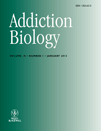
ADDICTION BIOLOGY
Scope & Guideline
Elevating the Discourse in Addiction Science
Introduction
Aims and Scopes
- Neurobiological Mechanisms of Addiction:
Research investigating the neurobiological foundations of addiction, including the role of neurotransmitters, brain structure, and neural circuits in substance use disorders. - Behavioral and Cognitive Aspects of Addiction:
Studies examining the behavioral and cognitive processes associated with addiction, including decision-making, impulsivity, and reward processing. - Impact of Early Life Experiences on Addiction Vulnerability:
Exploration of how early life adversities, such as trauma and stress, influence the development of addiction and related behaviors. - Sex Differences in Addiction:
Research addressing the differences in addiction vulnerability, progression, and treatment responses between males and females. - Genetic and Epigenetic Contributions to Addiction:
Investigations into genetic predispositions and epigenetic changes that affect susceptibility to addiction and treatment outcomes. - Translational Research and Treatment Approaches:
Studies aimed at translating findings from basic research into clinical applications, including pharmacological and behavioral interventions for addiction.
Trending and Emerging
- Neuroimaging and Neural Connectivity:
An increase in studies utilizing advanced neuroimaging techniques to explore brain connectivity and its relation to addiction behaviors, providing insights into the neural mechanisms underlying substance use disorders. - Interdisciplinary Approaches to Addiction:
A trend towards interdisciplinary research that combines perspectives from psychology, neuroscience, genetics, and social sciences to better understand addiction and develop comprehensive treatment strategies. - Personalized and Precision Medicine in Addiction Treatment:
Emerging research focusing on personalized treatment approaches that consider individual genetic, epigenetic, and environmental factors in designing effective interventions for substance use disorders. - Impact of Digital and Social Media on Substance Use:
Growing interest in how digital behaviors and social media influence substance use patterns, particularly among younger populations, highlighting the need for research in contemporary contexts. - Exploration of Novel Therapeutics:
An uptick in studies investigating novel therapeutic agents, including psychedelics and other emerging compounds, as potential treatments for addiction, reflecting a shift towards innovative approaches.
Declining or Waning
- Traditional Pharmacological Approaches:
There is a noticeable reduction in publications solely focused on traditional pharmacological treatments for addiction, as researchers increasingly explore integrative and personalized approaches. - Animal Models of Addiction:
The reliance on conventional animal models for studying addiction mechanisms seems to be declining, potentially due to a growing emphasis on human studies and translational research. - General Substance Use Patterns:
Research addressing broad patterns of substance use without focusing on specific biological mechanisms or implications appears to be less prevalent, indicating a shift towards more targeted studies.
Similar Journals

International Journal of Mental Health and Addiction
Innovating Solutions for Mental Health ChallengesThe International Journal of Mental Health and Addiction, published by Springer, stands as a premier resource within the field of psychiatry and mental health. With an impressive impact factor placing it in the Q1 category and ranking #17 out of 567 journals in its discipline according to Scopus, this journal plays a crucial role in advancing scholarly research and practices related to mental health and addiction. Since its inception in 2006, the journal has committed to disseminating high-quality, peer-reviewed work that addresses contemporary challenges in mental health, including innovative treatment strategies, policy implications, and psychosocial dynamics. Operating from New York, USA, the journal also aims to foster interdisciplinary collaboration, providing a platform for researchers, clinicians, and policymakers. While it does not offer open access, the publication is dedicated to making impactful research accessible to its audience by ensuring that content is widely disseminated. The International Journal of Mental Health and Addiction, with its rigorous editorial standards and dedication to mental health advancement, remains an essential journal for anyone pursuing knowledge in the ever-evolving landscape of mental health and addiction.
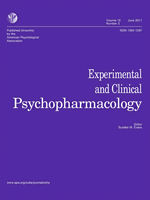
EXPERIMENTAL AND CLINICAL PSYCHOPHARMACOLOGY
Bridging Research and Clinical Practice in PsychiatryEXPERIMENTAL AND CLINICAL PSYCHOPHARMACOLOGY, published by the American Psychological Association, stands as a pivotal resource within the fields of pharmacology and psychiatry. With an ISSN of 1064-1297 and an E-ISSN of 1936-2293, this journal contributes significantly to the understanding of psychopharmacological interventions through its rich array of research articles, reviews, and clinical studies. Classified within the Q2 category in both Pharmacology and Psychiatry and Mental Health, it reflects a solid standing in academic performance, evidenced by its rankings in Scopus, where it places within the top half of its categories. Spanning from 1993 to 2024, it seeks to provide an essential platform for the dissemination of knowledge and advancements that influence clinical practice and therapeutic approaches. Although not an open-access journal, its impact on the development of evidence-based psychopharmacological treatments cannot be overstated, making it a vital resource for researchers, clinically active professionals, and students eager to stay abreast of cutting-edge developments in mental health and pharmacology.
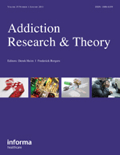
ADDICTION RESEARCH & THEORY
Advancing the Science of Addiction.ADDICTION RESEARCH & THEORY, published by Taylor & Francis Ltd, is a leading academic journal dedicated to advancing the understanding of addiction through innovative research and theoretical frameworks. With its ISSN 1606-6359 and E-ISSN 1476-7392, this journal serves a diverse audience, including researchers, healthcare professionals, and students in the field of medicine. The journal, classified in the Q2 category of Medicine (Miscellaneous) as of 2023, and ranking in the 76th percentile in Scopus, demonstrates a robust impact within the community, reflecting its commitment to high-quality research and discourse. With publications spanning from 1993 to 2024, ADDICTION RESEARCH & THEORY aims to provide a comprehensive platform for the latest empirical studies, critical reviews, and theoretical discussions on addiction, making it essential for anyone engaged in this vital area of health and social issues. Although it does not currently offer Open Access options, the journal remains a critical resource for scholarly communication, contributing significantly to the fields of addiction medicine and psychiatry.
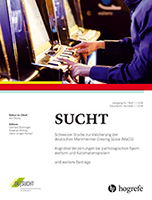
Sucht-Zeitschrift fur Wissenschaft und Praxis
Bridging research and practice in addiction studies.Sucht-Zeitschrift für Wissenschaft und Praxis, published by HOGREFE AG in Switzerland, is a pivotal journal addressing the interrelated fields of addiction science and mental health. With an ISSN of 0939-5911 and an E-ISSN of 1664-2856, this journal has been dedicated to fostering interdisciplinary research and practical applications since its inception in 1991, continuing through to 2024. As a respected source in the field, it holds a 2023 Q3 quartile ranking in Medicine (miscellaneous), a Q4 ranking in Psychiatry and Mental Health, and a Q3 ranking in Public Health, highlighting its broad relevance and growing impact on contemporary health discussions. While currently not offering open access options, the journal provides a rich platform for researchers, practitioners, and students to share and gain insights into innovative practices and scientific findings that advance the understanding of addiction and its societal implications. With its contributions indexed in Scopus and a variety of rankings reflective of its quality, Sucht-Zeitschrift für Wissenschaft und Praxis serves as an essential resource for those committed to advancing knowledge and practice in addiction-related fields.

Substance Abuse
Bridging empirical studies with practical solutions.Substance Abuse is a premier scholarly journal published by SAGE Publications Inc, dedicated to advancing the understanding and treatment of substance use disorders. With an established presence from 1995 to 2023, the journal boasts an impressive Q1 ranking in both Medicine (miscellaneous) and Psychiatry and Mental Health, positioning it among the top tier of academic publications in these fields. Researchers and professionals will find its articles, which are grounded in rigorous empirical studies and innovative interventions, essential for addressing the complex and multifaceted nature of substance abuse. Although not an open access publication, Substance Abuse maintains a commitment to sharing valuable insights and findings, making it a vital resource for those looking to enhance their knowledge and practice. Located in Thousand Oaks, CA, this journal serves as a critical forum for international dialogue and research dissemination, ensuring that current trends and challenges in substance use are thoughtfully examined and discussed within the academic community.
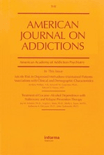
AMERICAN JOURNAL ON ADDICTIONS
Transforming Perspectives on Addiction and RecoveryThe AMERICAN JOURNAL ON ADDICTIONS, published by WILEY, stands as a premier publication within the realms of Clinical Psychology, Medicine, and Psychiatry. With its ISSN 1055-0496 and E-ISSN 1521-0391, the journal has been a critical resource since its inception in 1992, consistently evolving to encompass a wide scope of addiction research and its implications on public health. Renowned for its rigorous peer-reviewed articles, it boasts impressive rankings, including Q1 status in both Clinical Psychology and Medicine (miscellaneous) for 2023, and a respectable Q2 in Psychiatry and Mental Health. As a foundational platform for disseminating cutting-edge research, the journal aims to facilitate the exchange of knowledge among researchers, healthcare professionals, and educators alike. Its significant impact on the academic community is underscored by its Scopus rankings—placing it in the top 26% of Clinical Psychology journals and the top 28% in Medicine (miscellaneous). By fostering an understanding of addiction and its treatments, the AMERICAN JOURNAL ON ADDICTIONS plays an essential role in guiding innovative practices and shaping future policies within the field.
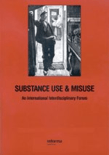
SUBSTANCE USE & MISUSE
Empowering professionals with evidence-based insights on substance misuse.SUBSTANCE USE & MISUSE, published by Taylor & Francis Inc, is an esteemed academic journal dedicated to the multifaceted study of substance use and its implications on health and society. With a notable impact factor and categorized in the Q2 quartile across multiple fields—including Health (Social Science), Medicine (Miscellaneous), Psychiatry and Mental Health, as well as Public Health—this journal serves as an essential platform for researchers, professionals, and students alike. Spanning from 1966 to 2024, it provides a rich archive of peer-reviewed articles that explore current trends, innovative research, and evidence-based practices in the management and understanding of substance use. The journal offers various access options, catering to the diverse needs of its audience and affirming its commitment to fostering scholarly discourse in the United Kingdom and beyond. By engaging with this journal, readers can enhance their understanding of the complexities surrounding substance use, making it a crucial resource for advancing knowledge and informing policy in this critical area of public health.
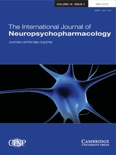
INTERNATIONAL JOURNAL OF NEUROPSYCHOPHARMACOLOGY
Pioneering insights into psychiatric disorders and treatments.The INTERNATIONAL JOURNAL OF NEUROPSYCHOPHARMACOLOGY, published by OXFORD UNIV PRESS, is a leading open-access journal in the fields of pharmacology and psychiatry, with an impressive impact factor reflecting its prominence in academic research. Since its inception in 1998, the journal has provided a crucial platform for the publication of high-quality research, offering insights into the effects of neuropharmacological agents on mental health. As of 2023, it ranks in the Q1 category for both Pharmacology and Psychiatry & Mental Health, underscoring its relevance and authority within the scientific community. With notable rankings in various medical subspecialties, it attracts contributions that advance our understanding of psychiatric disorders and therapeutic strategies. The accessible nature of the journal, following its transition to open access in 2015, has expanded its reach, making knowledge and findings readily available to researchers, professionals, and students globally. This commitment to disseminating impactful research ensures the journal remains at the forefront of neuropsychopharmacological advancements.
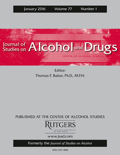
Journal of Studies on Alcohol and Drugs
Uncovering insights into health and substance use.The Journal of Studies on Alcohol and Drugs is a premier academic journal dedicated to advancing the understanding of alcohol and drug use, its effects, and its societal implications. Published by ALCOHOL RES DOCUMENTATION INC at the Center for Alcohol Studies, Rutgers University, this journal features comprehensive research that spans the disciplines of health, psychiatry, mental health, and toxicology. With its Q1 ranking in Health (Social Science) and Q2 ranking in Psychiatry and Mental Health, the journal plays a vital role in disseminating high-impact research that informs policy, prevention, and treatment strategies in addiction and substance use. The journal contributes significantly to the field, as evidenced by its solid Scopus rankings and engagement with contemporary issues, making it an essential resource for researchers, practitioners, and students. Although it does not offer open access, the journal's commitment to rigorous peer review and scholarship ensures that it remains at the forefront of research on alcohol and drugs through its converged publication timeline from 2007 to 2024.

PSYCHOPHARMACOLOGY
Illuminating the Impact of Drugs on Cognition and EmotionPSYCHOPHARMACOLOGY is a leading peer-reviewed journal specializing in the field of pharmacology, specifically focusing on the effects of drugs on behavior, cognition, and emotion. Published by Springer, this esteemed journal has established itself as a pivotal resource for researchers and professionals since its inception in 1959, maintaining its relevance and rigor in the ever-evolving landscape of psychopharmacological research. With an impressive impact factor and ranking in the top quartile (Q1) of the Pharmacology category in 2023, it consistently publishes high-quality studies that contribute to both academic inquiry and clinical practice. The journal's scope includes original research, theoretical papers, and reviews, fostering a multidisciplinary dialogue among psychologists, psychiatrists, pharmacologists, and neuroscientists. As the field of psychopharmacology continues to grow, PSYCHOPHARMACOLOGY remains dedicated to disseminating innovative findings, operationalizing complex concepts, and enhancing the understanding of drug mechanisms and their implications for mental health. This commitment to excellence positions PSYCHOPHARMACOLOGY as an indispensable tool for those seeking to advance their knowledge and research in pharmacology.